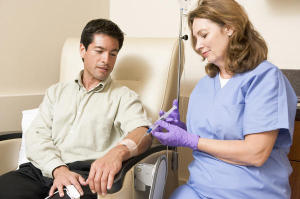What it takes to Become an Oncology Certified Nurse
The aging population and growing cancer rate is increasing the demand for oncology nurses who specialize in cancer treatment. According to Oncc.org, more than one in five people in the United States will be fifty-five years of age or older by 2030 and around seventy-seven percent of cancer patients are in that age group.
Oncology certified nurses are not only badly needed; they are also paid more than most other nurses. In 2006, the average yearly income for certified nurses, which included oncology nurses, was $9,200 higher than non-certified nurses. Most oncology nurses made between $47,132 and $85,575 in 2011.
Oncology Certified Nurse Overview
Oncology nurses are nursing professionals who specialize in patient care for those who are receiving treatment for cancer, or in recovery. Oncology certified nurses are recognized specialists in the field as demonstrated by their completion of a certification. The nature of the job requires specialized skills and training beyond what non-certified registered nurses and nursing assistants receive. The primary duties of an oncology nurse are to manage cancer patient care under doctor supervision, which could include administering chemotherapy drugs, radiation therapy or antibiotics. An oncology nurse may also give blood transfusions.
Oncology Certified Nurse Education Requirements
The first step to a career as an oncology nurse is to complete an undergraduate or diploma program in nursing to qualify to sit for a registered nurses (RN) examination. You must pass the test and get a license to be an RN. You can become an RN with only an associate’s degree that takes two years to complete or through a three-year diploma program. However, you must go on to obtain your bachelor’s degree, and then master’s to become an oncology nurse. Credits earned through an associate’s degree program count toward your bachelor’s and graduate degree while nursing diploma program classes do not.
Most candidates first complete a Bachelor of Science in Nursing (BSN) degree from a university or four-year college, and then apply for graduate school. Undergraduate programs may vary, but most expect you to successfully complete courses in physiology, anatomy, health assessment, and nursing principles.
You may wait to take the RN licensure test until after you finish your bachelor’s program. Either way, the test you take is called the National Council Licensing Examination for Registered Nurses (NCLEX-RN). Passing this test for a national RN license is required, as well as licensing in your state, to work as an RN. Oncology nurses are RNs with additional training.
Upon successful obtainment of a bachelor’s degree and acceptance into grad school, you must get a Master of Science in oncology nursing degree. It is a two-year program that focuses on the field of oncology. You must perform well in classes such as end of life care, advanced pharmacology, cancer detection and prevention, and types of oncology treatment. After grad school, you must become certified as an oncology nurse by completing a certification process.
Oncology Nurse Certification
The final requirement for becoming an oncology nurse is fulfilling the requirements for a nursing certification in this field. Certification for nurses is a formal recognition of an individual’s skills and knowledge in an area of nursing. The certification status tells potential employers that you have what it takes to be an oncology certified nurse, and your training extends beyond that of a RN license. Certification usually accompanies a higher salary and more autonomy. Although patients may not be aware of a nurse’s certification, they should benefit from the advanced care.
Nurses who wish to become certified in oncology take a test such as the OCN examination. The OCN exam evaluates your knowledge and competency for basic adult oncology nursing. If you pass this test, you may use the certification mark “OCN” to show that you have become an oncology certified nurse. Certification is valid for four years.
In general, registered nurses are valued members of nursing staff who are involved in all aspects of patient care, from first assessing a patient to monitoring patients’ vitals. RNs help design treatment programs and provide emotional support to patients and their loved ones. Nowhere is this service more important than in the field of oncology. Although not an official requirement, oncology certified nurses should possess above average communication and interpersonal skills.






